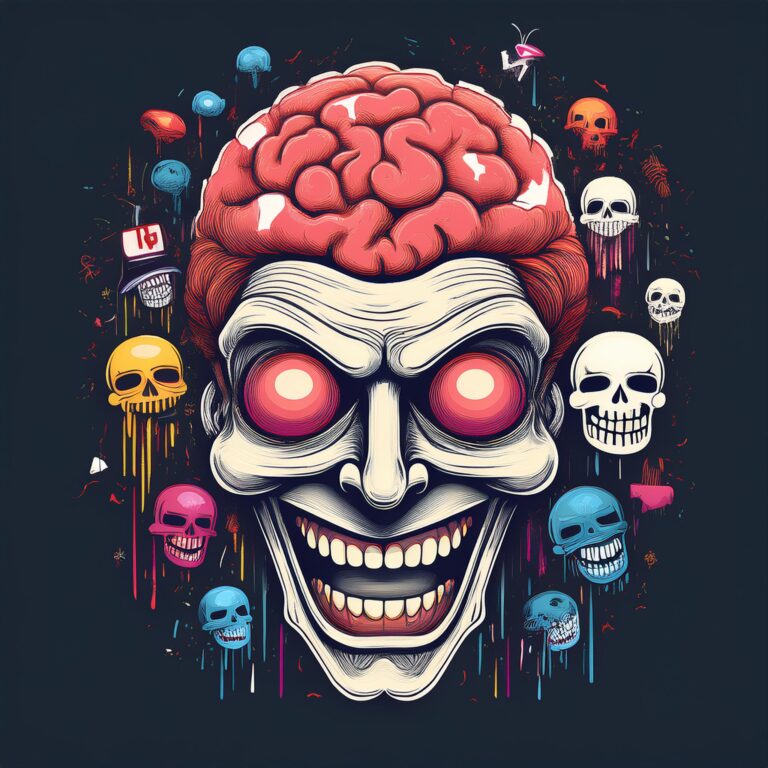Dark humor has always been a subject of intrigue and controversy. While some people find it offensive, others appreciate it as a sophisticated form of wit that tackles taboo subjects with a twist of irony. But what makes dark humor so appealing to certain individuals? In this article, we’ll delve into the psychology behind dark humor to understand why we find it funny and how it impacts our minds.
What Is Dark Humor?
Dark humor, also known as black comedy, involves making light of subjects that are generally considered serious, sensitive, or taboo. These topics can range from death and illness to existential crises and social issues. The humor arises from the juxtaposition of morbid or grim subjects with a comedic twist, challenging conventional notions of what’s acceptable in society.
The Cognitive Complexity of Dark Humor
Appreciating dark humor requires a higher level of cognitive processing. A study published in the Cognitive Processing journal found that individuals who enjoy dark humor tend to have higher IQs and are better at managing negative emotions. This is because understanding dark humor involves:
- Semantic Processing: Grasping the underlying meaning behind the joke.
- Emotional Detachment: Separating oneself emotionally to find humor in serious topics.
- Cognitive Flexibility: Shifting perspectives to see the lighter side of dark subjects.
Emotional Resilience and Coping Mechanism
For many, dark humor serves as a coping mechanism to deal with stress, anxiety, or traumatic experiences. By making jokes about grim realities, individuals can gain a sense of control over situations that might otherwise feel overwhelming. This form of humor allows for emotional catharsis, providing relief from psychological distress.
If you’re interested in other ways to cope with stress and improve your well-being, you might find our article on 10 Simple Ways to Make Your Home More Comfortable helpful. Creating a cozy environment can significantly impact your mental health.
Social and Cultural Influences
The acceptance and appreciation of dark humor can vary greatly depending on cultural and social backgrounds. In some cultures, dark humor is a common way to address historical traumas or societal issues. Understanding these nuances is crucial when sharing or interpreting dark jokes, as what might be humorous in one context could be offensive in another.
Personality Traits Linked to Dark Humor
Certain personality traits are often associated with an affinity for dark humor:
- Openness to Experience: A willingness to explore unconventional ideas.
- Emotional Stability: The ability to handle distressing topics without becoming overwhelmed.
- Low Aggressiveness: Contrary to popular belief, those who enjoy dark humor are often less aggressive and more emotionally balanced.
For a fun way to explore different personality traits and how they influence preferences, check out our piece on Are You Smarter Than a 5th Grader? Fun Questions to Test Your Knowledge.
The Fine Line Between Humor and Offense
Dark humor walks a tightrope between being funny and being offensive. The key to navigating this line is context and audience awareness. Comedians often use dark humor to shed light on important issues, but without careful delivery, the message can be lost or misinterpreted.
If you’re curious about how humor intersects with social interactions and relationships, our article on Exciting Date Ideas: Fun, Romantic, and Creative Date Night Ideas for Every Couple offers insights into creating positive experiences.
Psychological Benefits of Dark Humor
- Stress Relief: Laughter reduces stress hormones like cortisol.
- Social Bonding: Sharing dark humor can strengthen relationships among like-minded individuals.
- Perspective Shift: It encourages people to look at difficult situations from a different angle.
Potential Risks and Ethical Considerations
While dark humor can have benefits, it’s essential to be mindful of its potential risks:
- Emotional Harm: Jokes about sensitive topics can trigger negative emotions in others.
- Social Alienation: Misjudging your audience can lead to social backlash.
- Desensitization: Overexposure to dark humor might reduce empathy toward serious issues.
For guidance on navigating complex social dynamics, you might find our guide on The Ultimate Guide to Bangs: Choosing the Right Style for You metaphorically useful—sometimes, it’s all about finding the right cut.
Dark Humor in Media and Pop Culture
Dark humor has made its mark in various forms of media, from literature and film to stand-up comedy and internet memes. Shows like “Black Mirror” and comedians like George Carlin have used dark humor to comment on societal issues effectively.
To see how trends evolve and influence our preferences, take a look at our exploration of Y2K Fashion: The Ultimate Guide to Early 2000s Style Revival. It’s fascinating how past trends resurface, much like the recurring appreciation for dark humor.
Conclusion
Understanding the psychology behind dark humor reveals that it’s more than just making light of serious subjects—it’s a complex interplay of cognitive processing, emotional resilience, and social dynamics. While it may not be everyone’s cup of tea, dark humor serves as a lens through which we can examine difficult aspects of the human experience.
Related Articles



